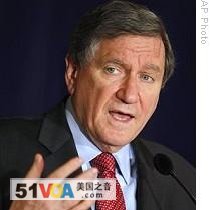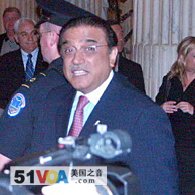Capitol Hill
05 May 2009
 |
| Richard Holbrooke, 18 Apr 2009 |
Mr. Holbrooke's testimony came as the Obama administration assesses growing threats from Taliban forces in Pakistan, and continues to fine tune its strategy for Afghanistan and the region generally.
Bills are pending in Congress to increase non-military economic and other aid as well as counter-terrorism and military training assistance to bolster the Pakistan military's ability to deal with the Taliban, including $400 million this year to establish a new Pakistan Counter-Insurgency Capability Fund.
But the administration and U.S. military have urged Congress not to impose conditions they assert could slow the process of forging a new strategic partnership with Pakistan.
Calling the House version of Pakistan aid legislation a very big improvement over previous legislation, Holbrooke nonetheless said certain provisions could increase misunderstandings in Pakistan about U.S. support.
"I greatly appreciate its motives but I do want to be sure that I am preserving [emphasizing] that there are things in it which Secretary Clinton and I and our colleagues do want to work with you on judicial system, law enforcement agencies, and public education system," said Richard Holbrooke.
Proposed legislation supports military aid, military education training, and hundreds of millions of dollars to strengthen Pakistan's Democratic institutions, judicial system law enforcement agencies and public education system.
But the House version contains stronger requirements than a Senate version, and would require a presidential determination that Pakistan has demonstrated sustained commitment to fighting terrorist groups, including ceasing any support for these groups by any element within the Pakistani military or its intelligence agency.
Congress could cut off aid, although lawmakers give the president waiver authority. While prohibitions would not apply to counter terrorism efforts along the Pakistan-Afghanistan border, lawmakers would require State Department concurrence with assistance provided by the Pentagon, and would prevent funding from being used to purchase or upgrade F-16 fighter aircraft.
The House bill also specifies that any aid from 2010 onward be provided only to a government in Islamabad constituted through a free and fair election, and requires Pakistani cooperation against nuclear supply networks.
Democratic Representative Howard Berman, the committee chairman, rejected suggestions that conditions were rigid or inflexible.
"Ambassador Holbrooke, we are simply asking the Pakistanis to keep the commitments they have already made to fight the terrorists who threaten our national security and theirs, and that they make some progress doing so, with progress defined very broadly," said Howard Berman. "If the President is unable make that determination, or a second one relating to cooperation on nuclear nonproliferation then he can always take advantage of the waiver we provide. Which of these conditions are unreasonable or unattainable? And if they are, then what does that tell us about our relationship with Pakistan?
Representative Berman and others say they look forward to seeing proposed benchmarks for progress that the Obama administration has been working on.
As these statements by Republican Dana Rohrabacher and Democrat Gary Ackerman made clear, many remain skeptical about how committed, and cooperative, Pakistan's government and military are on counter-terrorism and other issues.
ROHRABACHER: "If Pakistan is unwilling to work together with us on something as significant as the nuclear weapons perhaps in the hands of terrorists who might do harm to the United States, well then they do not deserve our help."
ACKERMAN: "Let me be blunt. Pakistan's pants are on fire. That's bad of course. But things are actually much, much worse. Pakistan's leaders, rather than recognizing and moving to address the urgent danger to their Constitution and country, instead seem convinced that if left alone or attacked piecemeal the Islamist flame will simply burn itself out. That hope is at best folly."
Pointing to what he called an air of panic created in Pakistan by media reports regarding Taliban advances in the Swat Valley, Ambassador Holbrooke said Pakistan's president raised concerns with him on his arrival in Washington.
 |
| Pakistan's President Asif Ali Zardari Enters Talks with U.S. House of Representatives Foreign Relations Committee, 05 May 2009 |
"Pakistan is of such immense importance to the U.S strategically and politically that our goal must be unambiguously to support and help stabilize a Democratic Pakistan headed by its elected President, Asif Ali Zardari," he said.
Holbrooke described as untrue media reports suggesting the Obama administration is distancing itself from the Zardari government in favor of political rival and former Prime Minister Nawaz Sharif.
Ambassador Holbrooke's testimony came as President Zardari and Afghan President Hamid Karzai met were on Capitol Hill meeting with House and Senate lawmakers, ahead of talks with President Obama and Secretary of State Hillary Clinton.